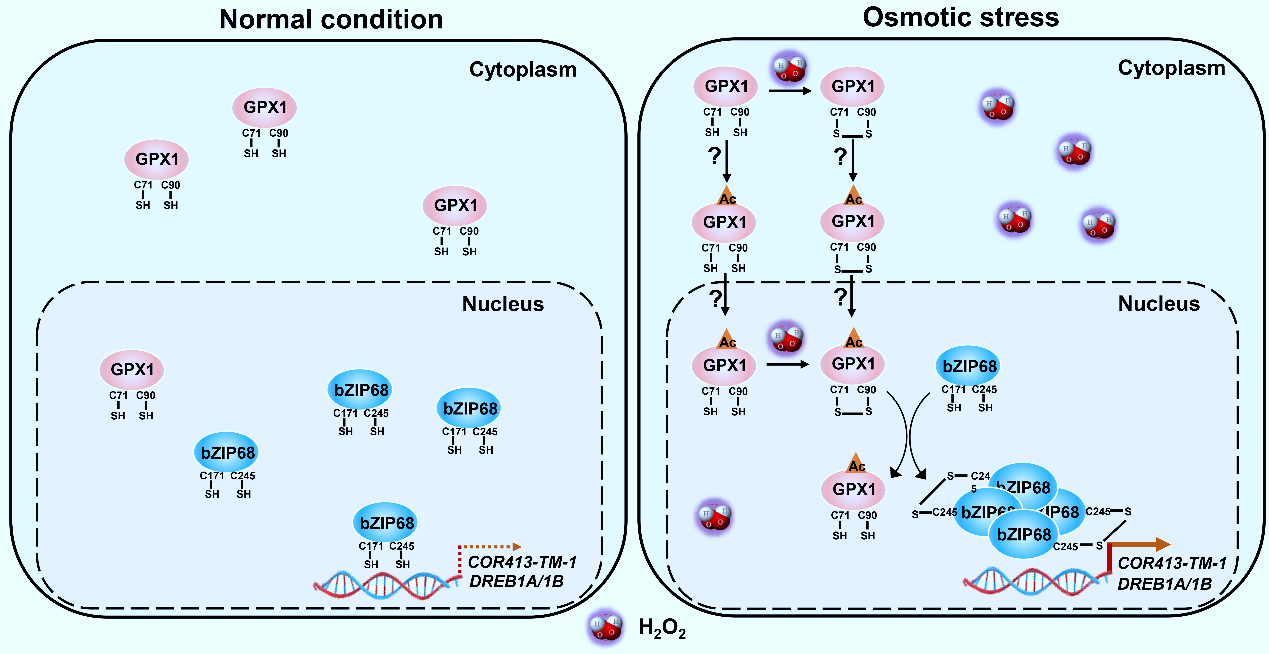Graphical Abstract

Highlights
- Report the key function of thiol peroxidase GPX1 in the response of rice osmotic stress, which acts as a redox sensor and sensor.
- bZIP68, a VRE-like basic leucine zipper (bZIP) transcription factor, is involved in the ABA-independent osmotic stress response pathway.
- Reveal the redox regulation of GPX1-bZIP68 module during osmotic stress.
- Highlight the coordination of protein acetylation and redox signals in response to plant osmotic stress.
The article is derived from a research paper on Molecular Plant by Xie Yanjie's group from college of life science, Nanjing Agricultural University. The paper reveals the mechanism of rice glutathione peroxidase as a redox sensor to sense and transmit osmotic stress signal transduction .
Osmotic stress caused by drought, salt damage, and cold damage is an important limiting factor for plant growth and crop yield. Plants sense and respond to changes in the external environment's penetration potential through a complex signal network. Osmotic stress usually leads to a large number of reactive oxygen species (ROS). Consequently, the mechanism of maintaining the redox balance response process in plant osmotic stress is one of the important scientific research issues of stress biology. However, how plants perceive and transmit redox signals under osmotic stress is worthy of further study.
Glutathione peroxidase (GLUTATHIONE PEROXIDASE1, GPX) is a type of thiol-based peroxidase, which can use glutathione (GSH) or other reducing equivalents to catalyze the reduction of hydrogen peroxide, organic peroxide, and phospholipid hydroperoxide. In animals, GPX is the core component of antioxidant metabolism, and its active center is selenocysteine; while the active site of plant GPX is cysteine, and its ability to remove active oxygen is far weaker than other types of antioxidant enzymes (such as catalase or ascorbate peroxidase), suggesting that plant GPX may have other important functions besides antioxidant activity. Researcher at college of life science, Nanjing Agricultural University shows that GPX1 acts as a redox sensor in response to rice osmotic stress. When rice is subjected to osmotic stress, a large number of reactive oxygen species can be produced, cytoplasmic GPX1 is rapidly oxidized and forms intramolecular disulfide bonds, and at the same time migrates into the nucleus.
Furthermore, GPX can interact with the transcription factor bZIP68. bZIP68 is a VRE-like transcription factor, which can activate the downstream expression of a series of osmotic stress response genes that do not depend on the ABA pathway. Oxidized GPX1 transmits oxidation signals to bZIP68. After bZIP68 is oxidized, it forms a homotetramer, which further improves its ability to bind and activate downstream osmotic stress-responsive genes and improve the adaptability of rice to osmotic stress in an ABA-independent manner. However, the nucleoplasmic migration of GPX1 is not affected by redox signals but is regulated by the degree of acetylation. Therefore, the study reveals that rice GPX1 is used as a redox sensor to sense and transmit redox signal pathways and methods, and also confirms the synergistic effect of different types of protein post-translational modifications in redox signal transmission.
The latest molecular plant reported in this article reveals the molecular mechanism of rice redox sensor in signal transduction of osmotic stress. Provide novel ideas and foundations for rice research and development. Creative Biolabs offers model organism antibody custom service, just contact us to choose the right anti rice bZIP68 or anti rice GPX1 products.
The work was published in the well-known scientific journal "Molecular Plant".
Story Source: Zhou H, Zhang F, Zhai F, et al. Rice GLUTATHIONE PEROXIDASE1-mediated oxidation of bZIP68 positively regulates ABA-independent osmotic stress signaling[J]. Molecular Plant, 2021.
Creative Biolabs is committed to providing high-quality reagents and one-stop technical services for model organism researchers worldwide. We have a full line of high-quality antibodies targeting rice bZIP68 and rice GPX1. Please feel free to contact us.
Click the following to view our featured products.

